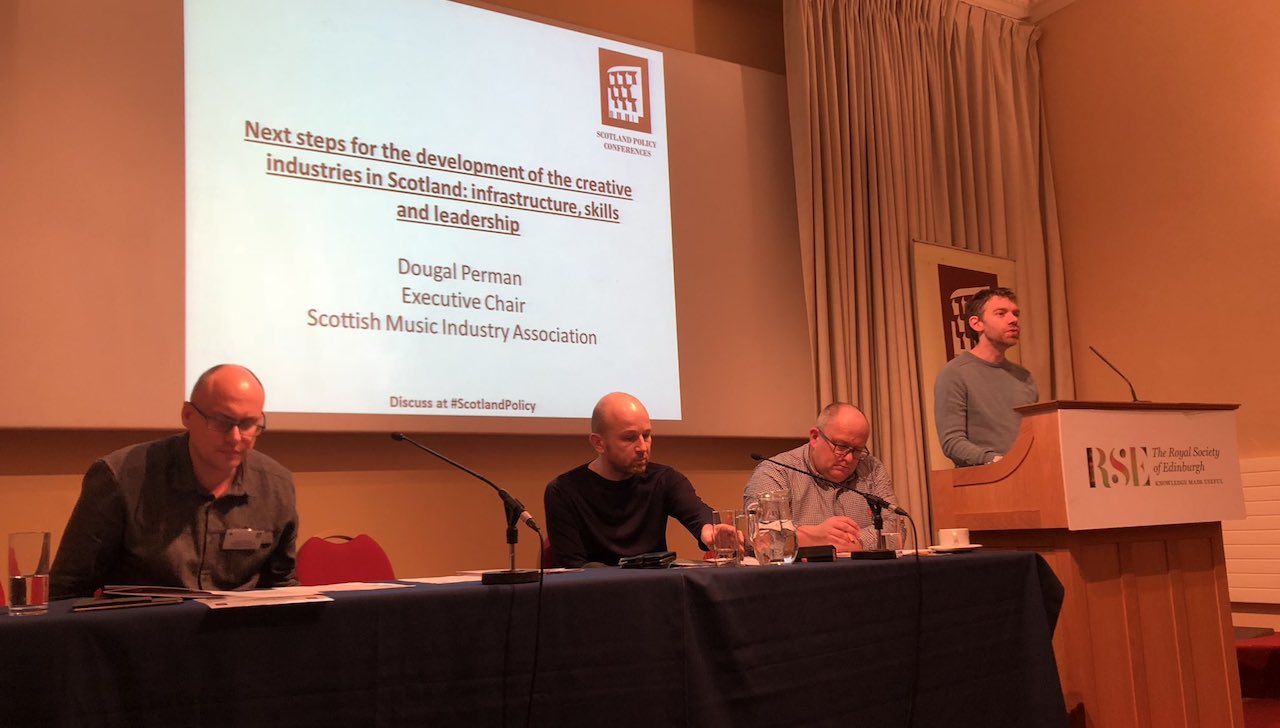Talent is the liquidity that flows through the creative economy.
This is a speech that SMIA Executive Chair Dougal Perman gave at the Scotland Policy Conference on Next steps for Scotland’s creative industries: the screen sector, tourism and The Scottish Government’s Culture Strategy, which was held at the Royal Society of Edinburgh on 11 December 2018.
Scotland is an innately creative nation. The organisation I lead, the Scottish Music Industry Association (or SMIA), exists to represent and develop the music industry in Scotland. The SMIA believes that Scotland has an abundance of creative talent but lacks sufficient industry infrastructure to nurture it. By investing in skills development and inspiring leadership in music industry businesses, we can support the ecosystem and establish an environment that enables our creative talent to flourish.
I’m part of Cabinet Secretary for Culture, Tourism and External Affairs Fiona Hyslop’s Creative Industries Advisory Group. In the group we have discussed what infrastructure means. For government the term describes physical and organisational structures essential for society and enterprise to operate. In the creative industries, many of us use the term to describe industry sub-sectors that facilitate trade. Music industry sub-sectors include artist management, booking agents, record labels, recording studios, music publishers, music venues, event promoters, music teachers, legal representation, financial advice and so on. They are the moving parts of the music industry machine. They are essential elements of its ecosystem. And I’ve come to realise that the music industry doesn’t have a supply chain but rather a supply web because its constituent parts trade with each other.
We do, of course, have excellent examples of Scottish businesses which are part of our music industry ecosystem. We continue to have a thriving live scene, for example, but venues and promoters face numerous challenges that threaten it, especially regarding property development, licensing restrictions and noise complaints. Music education is vulnerable currently which is of concern if we are to ensure that we continue to have an abundance of creative talent in Scotland because, without that, we lack our most valuable industry resource. Both of these issues are often, rightly, on the agenda at the Scottish Parliament’s Cross Party Group for Music.
To build up music industry infrastructure, we need to learn more business skills, share and analyse information and use our innovative mindsets to attain focus and inspire effective leadership. To achieve these ambitions, thanks to becoming one of Creative Scotland’s Regularly Funded Organisations, the SMIA is deploying a learning programme of business skills training, providing consultancy, compiling resources, working with universities on market research projects and continuing our renowned celebration of new music, the Scottish Album of the Year Award.
In the wider business world, consultants and trainers often talk about the need to stimulate the right-hand-side of our brains and develop creative thinking. In the creative industries I think we probably have the opposite challenge. When it comes to focused business development, we sometimes need to curb our creative instincts and concentrate on strategic, logical and pragmatic thinking. Many of the music business practitioners we speak to tell us they are comfortable with the creative side of things and, for established operators, with how the music industry works, but they would benefit from learning more core business skills. To help with this, and based on research we have conducted into music industry skills gaps and learning needs, our learning programme includes financial planning, raising finance, marketing and business development and productivity.
So creativity is innate and business skills are vital. And in order to grow, leadership is also essential. Entrepreneurs have to play many roles during the growth of their business. But to be an effective entrepreneur, you need to do less operationally, think and act strategically and lead in a visionary way. That requires focus and delegation. And to delegate you need people to delegate to, which costs money. These are difficult challenges to overcome when you are stretched very thin. We can address this issue through collaboration.
No creative industry sector exists independently. I’m keen to encourage more trade, information and knowledge sharing between creative industry sectors. I also think we need to look outside the creative industries. We can learn a lot from other industries. And we can teach them about creativity and innovation in return.
Creativity is part of our culture. It’s good for the economy and for society. In times of scarce financial capital, cultural capital is increasingly important.
Talent is the liquidity that flows through the creative economy.
Let’s continue to nurture, champion and celebrate our creative talent. And let’s work together to grow the skills, support the infrastructure and inspire the leadership necessary to develop the creative industries so that our creative talent can flourish.
Dougal’s speech prompted lively discussion on these topics especially around the importance and vulnerability of music education in Scotland. Brian Ferguson from The Scotsman was covering the conference and quoted Dougal in: Scottish culture ‘put at risk’ by fees for music lessons, industry warns.
